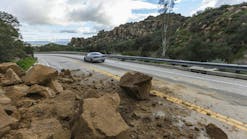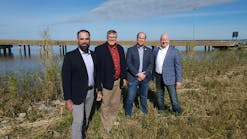Washington Department of Ecology Sets New Limits on Storm Water Pollution at Industrial Facilities
Source Washington Department of Ecology
The Washington Department of Ecology (Ecology) placed new limits on pollution in storm water runoff from industrial facilities, affecting about 1,200 permitted facilities across the state.
Changes under the state’s new industrial storm water permit reduce how much copper and zinc the industries can have in their storm water discharges. Copper is commonly found in brake pads, paints and many industrial materials. It can cause salmon to lose their ability to sense the presence of predators and spawning grounds. Zinc is pervasive in industrial settings, washing off chain link fences and galvanized roofs; and it binds with silt and can harm or suffocate fish.
“We know that meeting these new permit requirements in the real world will be a challenge for some facilities, and we will provide technical assistance,” said Kelly Susewind, manager of Ecology’s water quality program. “We believe the new permit is reasonable and protective. It allows businesses the time and flexibility to reduce storm water pollution with the knowledge that they’re complying with the Clean Water Act.”
Ecology collaborated with both environmental and industrial interests before writing the new permit.
About 70% of the state’s industrial storm water general permit holders are in the 12 counties that border Puget Sound.
The new permit goes into effect Jan. 1, 2010. Industries will have until mid-May to submit their first quarter 2010 storm water discharge monitoring reports.
Industries will have until July 1 to implement certain newly-required practices. Some of these include:
• Vacuum-sweeping of paved surfaces once every three months;
• Keeping all dumpsters under cover and lid closed when not in use;
• Cleaning catch basins when they are full; and
• Inspecting all equipment for leaking fluids, and taking leaky machinery out of service until repaired.
Ecology will hold workshops in January educating people about the new permit requirements, and it will publish new storm water sampling and industry-specific guidance.
“We will use our website and e-mail lists to keep industries informed about the technical assistance we will provide,” Susewind said.
Source: Washington Department of Ecology






